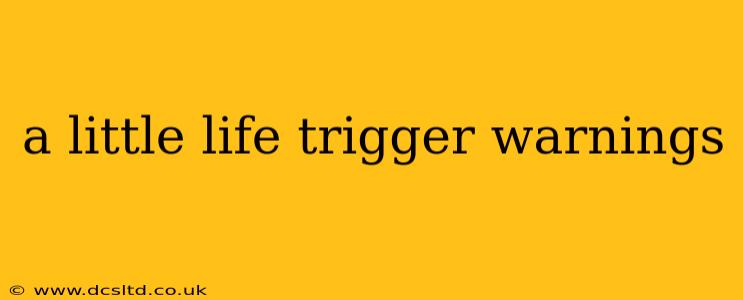A Little Life: Trigger Warnings and Content Considerations
Hanya Yanagihara's A Little Life is a powerful and emotionally resonant novel, but its unflinching portrayal of trauma means it contains significant trigger warnings. Readers considering picking up this book should be aware of its potentially upsetting content. This post will detail the major triggers present and offer guidance for navigating the reading experience.
What are the major trigger warnings for A Little Life?
This novel delves deeply into the lives of four college friends, focusing intensely on Jude St. Francis's experiences. The book is not for the faint of heart and contains depictions of:
-
Severe childhood abuse (physical, sexual, and emotional): This is a central theme throughout the novel and is described in graphic detail. The abuse Jude endures is extensive and prolonged, impacting every aspect of his adult life.
-
Self-harm and suicide ideation: Jude struggles immensely with the psychological consequences of his past, leading to recurring instances of self-harm and thoughts of suicide. These are depicted realistically and without glorification.
-
Graphic depictions of violence: The novel contains scenes of violence, both physical and psychological, that some readers may find disturbing.
-
Sexual assault: The book portrays Jude's experiences of sexual assault in detail, highlighting the devastating long-term effects of such trauma.
-
Mental health struggles: The novel explores a wide range of mental health issues, including PTSD, depression, anxiety, and complex trauma. These are portrayed with nuance and complexity, but the descriptions may be distressing for some readers.
-
Detailed medical procedures: The book details Jude's numerous injuries and the extensive medical interventions he undergoes. These descriptions might be upsetting to readers with a fear of medical procedures.
How can I decide if I should read A Little Life?
The decision of whether or not to read A Little Life is a personal one. Consider the following questions:
-
Am I prepared to read about extremely graphic depictions of trauma? If the answer is no, this book may not be suitable for you at this time.
-
Do I have a strong support system in place? Reading a book with this level of intensity can be emotionally taxing. Having access to friends, family, or a therapist can be crucial.
-
Am I currently struggling with my own mental health challenges? If you are, reading this book might exacerbate your symptoms. It's essential to prioritize your well-being.
-
Am I aware of the potential triggering content? Knowing what to expect can help you prepare for difficult passages and potentially take breaks as needed.
What if I start reading and find it too difficult?
It’s perfectly acceptable to stop reading if the content becomes too overwhelming. There's no shame in prioritizing your mental health and choosing not to finish a book that causes significant distress. Remember that reading should be an enjoyable experience, and forcing yourself to continue can be detrimental.
Are there any resources available to help me process the difficult content?
If you find yourself struggling with the emotional impact of the book, please reach out for support. Consider talking to a therapist, counselor, or trusted friend or family member. There are also many online resources available that can offer guidance and support.
A Little Life is a challenging but important novel that sparks crucial conversations about trauma, healing, and friendship. However, it’s essential to approach it with self-awareness and a plan for self-care. This book is a significant commitment, and the potential for emotional distress is substantial. Your well-being should always be your top priority.
